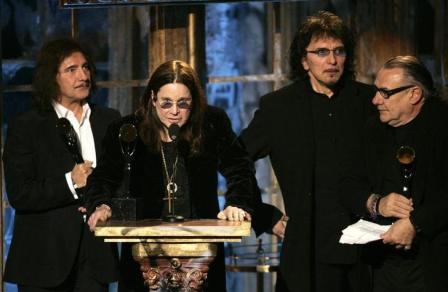I was the last interview of the day on June 7 for Black Sabbath duo Ozzy Osbourne and Geezer Butler, and I had 25 minutes to ask 25 questions about their new album, called 13. I think it worked out OK, actually. This interview was the cover story for the July issue of Billboard Brazil.
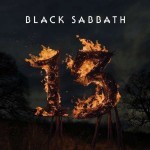 The last time Ozzy Osbourne released a new album with Black Sabbath, disco ruled the world. Dance songs by Donna Summer (“MacArthur Park”), Chic (“Le Freak”) and the Rolling Stones (“Miss You”) topped the charts in the second half of 1978.
The last time Ozzy Osbourne released a new album with Black Sabbath, disco ruled the world. Dance songs by Donna Summer (“MacArthur Park”), Chic (“Le Freak”) and the Rolling Stones (“Miss You”) topped the charts in the second half of 1978.
Black Sabbath’s brand of heavy metal, never fashionable to begin with, was now irrelevant. And the band itself had become a joke, torn apart by drugs and alcohol, financial problems and lawsuits. Osbourne was ousted soon after their album Never Say Die! was greeted with general apathy, and he embarked on a successful solo career steered by the patient woman who would become his wife and manager, Sharon Osbourne.
Black Sabbath continued touring and recording without Osbourne, although guitarist Tony Iommi was the only constant as various members came and went over the ensuing 18 years of wildly uneven quality control. The original lineup, rounded out by bassist Geezer Butler and drummer Bill Ward, reunited in 1997. The band, occasionally without Ward, toured North America and Europe, and tried unsuccessfully to record an album in 2001. (They are pictured below at their Rock and Roll Hall of Fame induction in 2006, l-r Butler, Osbourne, Iommi, Ward.)
Fast-forward to 2013. Black Sabbath, again without Ward who pulled out due to a contract dispute, have recorded a brand new album, 13. Black Sabbath will play Brazil for the first time since 1994 – and for the first time ever with Osbourne – later this year in Porto Alegre (Oct. 9), Sao Paulo (Oct. 11) and Rio de Janeiro (Oct. 13).
“I’ve heard there’s a lot of excitement down there for us to come,” Osbourne, sitting alongside fellow Los Angeles resident Butler, said at the outset of an exclusive interview with Billboard in a West Hollywood hotel suite.
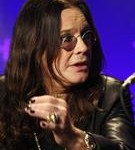 Osbourne, 64, absent-mindedly referred to Brazil’s largest city as “San Pablo,” raising fears that our conversation might be full of confusion, a live replay of his role as the perpetually addled dad from the hit TV show The Osbournes
Osbourne, 64, absent-mindedly referred to Brazil’s largest city as “San Pablo,” raising fears that our conversation might be full of confusion, a live replay of his role as the perpetually addled dad from the hit TV show The Osbournes. But you underestimate Osbourne at your risk if you judge him solely by his thick Birmingham mumble, his hunched posture and baby-step gait. If he is on the correct mix of medications, he is whip-smart and highly opinionated. His cryptic wit may take a few hours to register. At one point, Butler said Osbourne often came up with the “genesis” of a song’s lyrics “and I’d just write the rest.” Osbourne mumbled, “And so I come up with the Phil Collins.” His joke went unnoticed until the tape was played back.
When veteran bands make new albums after long gaps, the results can be horrific. Witness Aerosmith’s recent effort Music From Another Dimension! But metal fans will probably be able to breathe a sigh of relief after hearing the eight songs on 13 (there are three or four more songs on various “deluxe” versions).
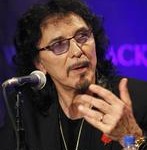 Iommi (pictured at left), despite being stricken with lymphoma and accordingly absent from promotional activities, dusts off some mighty blues-based riffs. Butler’s masterful melodic bass is high in the mix, and his lyrics cover familiar themes of death, destruction and devils. Osbourne, long viewed as the weak link in Black Sabbath on account of his addictions and cartoonish image, has provided the biggest surprise. His assured vocal delivery is eerily compelling.
Iommi (pictured at left), despite being stricken with lymphoma and accordingly absent from promotional activities, dusts off some mighty blues-based riffs. Butler’s masterful melodic bass is high in the mix, and his lyrics cover familiar themes of death, destruction and devils. Osbourne, long viewed as the weak link in Black Sabbath on account of his addictions and cartoonish image, has provided the biggest surprise. His assured vocal delivery is eerily compelling.
Early reviews have been favorable, and no one has missed the opportunity to point out the historic nature of this album – Osbourne’s first with Black Sabbath in the lifetimes of most of the fans who will pack Brazil’s parks later this year. Don’t believe the hype. Even Osbourne and Butler, with an unmistakable air of regret, will tell you that this is not really a Black Sabbath album in the strictest sense. Ward’s absence is strongly felt.
“Sabbath, to us, is the four of us,” said Butler, 63, referred to as Terry — his real name — by Osbourne. “We always think of Sabbath as being Ozzy, Tony, Bill and me. That’s our Sabbath. It’s just really sad that it didn’t work out this time.”
After Ward, 65, went public with his refusal to sign what he considered to be an unfair contract, the three others pressed on without him. The illness of Iommi, also 65, was a salutary reminder that they could not keep wasting time.
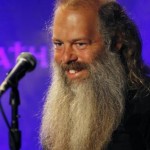 Producer Rick Rubin (right), who for years had been stalking the band – sometimes to their discomfort – recruited Brad Wilk (below), best known as the drummer for Rage Against the Machine and the spinoff band Audioslave. The foursome’s first week in the studio, dusting off old Sabbath songs, was uncomfortable. But they clicked in the second week.
Producer Rick Rubin (right), who for years had been stalking the band – sometimes to their discomfort – recruited Brad Wilk (below), best known as the drummer for Rage Against the Machine and the spinoff band Audioslave. The foursome’s first week in the studio, dusting off old Sabbath songs, was uncomfortable. But they clicked in the second week.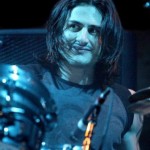
“I’d love Bill to have been on it, but I think Brad did a great job, a fantastic job,” Osbourne said. “But obviously we all really wanted Bill on drums.”
“There’s nobody like Bill,” Butler said. “He’s unique. He can play rock but he grew up with Gene Krupa and Buddy Rich. They were his heroes and that’s the way he learned. He still has those elements in him. He’ll play rock but with a swing feel kind of thing, and there’s nobody that can do that apart from him. That’s why Rick wanted Brad to come in because he was the closest to play like that.” 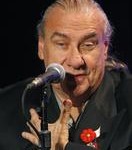
Has Ward heard the album?
“He’s not camping out to buy the first copy, I don’t think,” Osbourne said.
Added Butler, “He’s having a bonfire night.” Pointing to a poster of the disappointingly mundane album cover, depicting the number 13 engulfed in flames, he said, “That’ll be us on that thirteen.”
Osbourne and Butler, who are touring with Osbourne’s drummer Tommy Clufetos, said the door is still open should Ward decide to return to the fold. “It’s not quite there for me,” said Osbourne. “I’d like the four of us to do an album.”
Paradoxically, while the album has a traditional apocalyptic feel, the band’s future has never seemed brighter. “Well, what’s left of it, yeah,” Butler said. “What’s left of us! It depends, y’know, how long we can live for.”
Black Sabbath have built their career singing about death, but it’s one thing to sing about it when you’re a robust twentysomething and another to sing about it when your guitarist is battling cancer. Butler said he and his bandmates have “definitely became aware of our mortality … You can feel it and taste it and touch it.”
The first single, God Is Dead?, is a nine-minute epic inspired by a magazine cover that Osbourne spied in a doctor’s office. “I thought of it – all the things that are happening for different religions, like they fly planes into the World Trade Center or whatever it was. And then people blow themselves up in market places with suicide bombs, for God and Country,” he said.
Osbourne took the idea to Butler, a Catholic of Irish heritage, who appears to have given it a different spin. “It’s not anti-religious,” Butler said. “‘God is Dead?’ is about somebody that’s trying to prove the existence of God. That’s why he turns around at the end and says, “I don’t believe that God is dead” … It’s like he’s seen Nietzsche or something. He’s read that God is dead somewhere and he wants to prove that God isn’t dead.” To complicate matters, the video depicts a Jew, a Muslim and a Christian apparently disavowing their faiths.
But there’s little confusion about the album’s final track, Dear Father, a venomous tirade against pedophiles in the church. Its venom recalls that hurled against the masters of war in their staple War Pigs
. “For years we’d been condemned by the Christian church and Catholic church and everything,” Butler said. “Well, who’s the hypocrites now? Of all the evil people in the world there’s nothing worse than a pedophile priest, to me.”
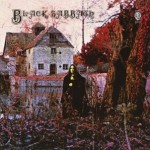 The song begins with the sound of a drill, which this interviewer wondered was meant to symbolize sodomy. Butler and Osbourne stared back blankly. The sound effect was news to them, although they were uncomfortably aware that the album ends with the sound of thunder and church bells, a cheesy nod to the ominous effect that begins their self-titled debut album
The song begins with the sound of a drill, which this interviewer wondered was meant to symbolize sodomy. Butler and Osbourne stared back blankly. The sound effect was news to them, although they were uncomfortably aware that the album ends with the sound of thunder and church bells, a cheesy nod to the ominous effect that begins their self-titled debut album (pictured).
The final product is very much a reflection of Rubin’s vision. The musicians recorded about 16 songs and left everything else to him and their respective managers (Butler and Osbourne are managed by their wives). Most of the songs were written by the band before they went in to the studio (nothing was used from the aborted 2001 sessions), with the exception of a pair that began as studio jams — Zeitgeist, a trippy sci-fi tune in the mold of “Planet Caravan,” and Damaged Soul
. Both are considered highlights. In an ideal world, that’s how they would have made the whole album.
“Damaged Soul was an 18-minute jam that we did in the studio while we were warming up to do whatever we were in the studio for that day,” Butler recalled. “Rick recorded it. And then we went to do the song that we were there to do, and he went, ‘Hang on a minute, that was brilliant.’ And we were going, ‘What was?’ And he said, ‘What you just did.’ It was just a jam. He loved it. But he needed it to get down to seven minutes. So we tried a seven-minute version and it didn’t work. It just didn’t have the same feel because the other one was, like, subconsciously we did it. So eventually he said, ‘Let me work with it.’ And he edited it down to, like, seven minutes, Ozzy went in and put vocals and harmonica to it. And that was it. It was just totally raw.”
 Does Butler ever wonder about the inherent lunacy of a group of sixtysomethings writing songs about Satan and demons and blood, as if they were the illegitimate grandfathers of Beavis and Butt-head? No, of course not. “It’s like reality,” he said. “If we’re doing a Katy Perry song, or something, then we would look really stupid. “California Girls,” or something, at our age. Or Ke$ha, or something. We’d look absolutely ridiculous, so we stick to what we know best.”
Does Butler ever wonder about the inherent lunacy of a group of sixtysomethings writing songs about Satan and demons and blood, as if they were the illegitimate grandfathers of Beavis and Butt-head? No, of course not. “It’s like reality,” he said. “If we’re doing a Katy Perry song, or something, then we would look really stupid. “California Girls,” or something, at our age. Or Ke$ha, or something. We’d look absolutely ridiculous, so we stick to what we know best.”
Like most writers, he waits until the last minute to come up with lyrics, often drawing inspiration from watching the evening news and getting angry. His disappointment with the Obama administration helped inspire the line “seeds of change that don’t bear fruit” in Dear Father. “And it’s the whole hippie era as well,” he added, noting that the ’60s counterculture and subsequent movements all the way up to the Occupy protests never amounted to much.
And don’t get him started on politicians. “When George Bush came in it completely changed the whole way of looking at politics, I think. He just walked over everything that you’ve ever known. Everything that America supposedly stood for he just washed it out the way and invaded whoever he wanted to invade.”
As for Obama, “He’s probably worse than ever, with all the (spying) scandals that are going one now. Everybody thinks, ‘Oh he’s Democrat, he’s black, he’s gonna be totally different, we can trust this guy.’ But of course you can’t. He’s just the face of what goes on in the world.”
And so Butler puts pen to paper because if he went down to the pub to vent his frustrations, the unfortunate souls within earshot would “probably slit their wrists!”
To quote Jim Morrison, the future’s uncertain and the end is always near. And that’s definitely the case with Sabbath. Osbourne is happy to do another album, although much depends on Iommi’s health, and commercial reaction to the album and tour. Butler is just relieved to have a new album that secures his band’s legacy by picking up where its iconic early albums left off. “We couldn’t leave (Never Say Die!) as the last Sabbath album. It’s of its time, that album. Whereas the other stuff lives on still.”
###
NOTE: Unrelated to the above interview, my memoir Strange Days: The Adventures of a Grumpy Rock ‘n’ Roll Journalist in Los Angeles is available here. For more info, go to strangedaysbook.com
Copyright © 2013 by Dean Goodman. PLEASE DO NOT CUT AND PASTE THE WHOLE THING

